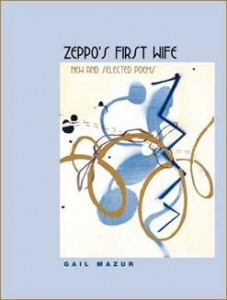Winner of the 2006 Massachusetts Book Award for Poetry
Passaic County Community College: Paterson Poetry Prize, Short Listed/Finalist Apr 6, 2006
WIDELY ACCLAIMED for expanding the stylistic boundaries of both the narrative and meditative lyric, Gail Mazur’s poetry crackles with verbal invention as she confronts the inevitable upheavals of a lived life. Zeppo’s First Wife, which includes excerpts from Mazur’s four previous books, as well as twenty-two new poems, is epitomized by the worldly longing of the title poem, with its searching poignancy and comic bravura. Mazur’s explorations of “this fallen world, this loony world” are deeply moving acts of empathy by a singular moral sensibility—evident from the earliest poem included here, the much-anthologized “Baseball,” a stunning bird’s-eye view of human foibles and passions. Clear-eyed, full of paradoxical griefs and appetites, her poems brave the most urgent subjects—from the fraught luscious Eden of the ballpark, to the fragility of our closest human ties, to the implications for America in a world where power and war are cataclysmic for the strong as well as the weak.
“Imagine the audacity to entitle a new collection of poems Zeppo’s First Wife! Defying humdrum ideas of what is poetic, Gail Mazur’s title is too anti-lyrical for any old-fashioned notion of poetry. Yet its comedy is not merely wise-guy or superior in the glib manner sometimes called post-modernist. Here the element of tribute is real and sincere.> Read more
—Robert Pinsky,The Washington Post
“From the new poems in Zeppo’s First Wife one can watch the growth of an elegist of the first order. Grief’s abrasions on the soul, however, form only part of the story. As with all great elegies, Mazur’s expand her own sense of what it means to be alive, and this is true for the reader as well. We are often, in her poetry, put in the position of those left behind, and we too are required to make room for loss, absence and fracture…. Yet such attention constitutes Mazur’s affirmation of life, including its pain. (Her) tone is neither naïve nor doomed–instead, she sounds the grace notes of survivor knowledge….”
> Read more
—Fred Marchant, Provincetown Arts
“Gail Mazur’s poems articulate the ruminative, careful, attuned reflections of maturity, with its attendant wisdom, regret, and acceptance. Beautifully constructed, immediately absorbing, and prosaic in the most positive sense, they eschew verbal high jinks for clear-mindedness and make for deeply pleasurable reading.”
—Tina Barr, Harvard Review
